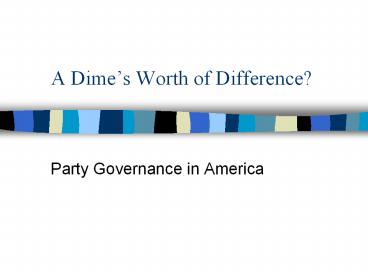A Dime - PowerPoint PPT Presentation
1 / 17
Title:
A Dime
Description:
Fund Cuba Democ Programs. Against. For. Increase BMD Funding. Against. For. Border Fence ... Republicans favor trade (except Cuba) and military expansion, oppose ... – PowerPoint PPT presentation
Number of Views:52
Avg rating:3.0/5.0
Title: A Dime
1
A Dimes Worth of Difference?
- Party Governance in America
2
I. The questions of party governance
- Do parties behave differently once in government?
- In a two-party system, are the two parties really
all that different? - Since American parties are weak, do their members
even follow party lines?
3
(No Transcript)
4
II. Do parties matter? The Party-Policy
Connection in Congress
- Roll-call votes Behavioral measure of ideology
(actions instead of words) - Limited to 109th/110th Congresses (2005-2006 and
2007-2008) - Controversial issues only (split is between 40-60
and 60-40) - High party unity on these votes (party line)
5
A. Foreign Policy Republicans hard-line,
skeptical of international cooperation
6
B. Economic Policy Republicans pro-business,
anti-tax, anti-union
7
C. Incompatible Values Republicans against Gay
Rights, Abortion, Drugs, Multiculturalism
8
D. Social Welfare Republicans willing to limit
or privatize
9
E. Environment Republicans less willing to trade
growth/profits for protection
10
F. Civil Liberties Issues Party split over which
liberties are sacrosanct
11
F. Civil Liberties Issues Party split over which
liberties are sacrosanct
12
G. Summary General differences between parties
in Congress
- Republicans favor trade (except Cuba) and
military expansion, oppose international courts
and environmental treaties - Republicans oppose abortion, gay rights,
government social welfare programs, services to
nonresidents, services to non-English speaking - Republicans favor business and higher-income
workers over lower-income workers or
environmental protection, and oppose taxes and
unions - Republicans seek to expand gun rights and
property rights but not speech rights or 4th
Amendment rights - Democrats are opposite on each of these dimensions
13
H. Caveat Party Unity Varies By Representative
(Weak Party Discipline)
- Example Republican Senators from Maine
- Surprise Despite reputation for unity,
Republican scores are lower than Democrat scores
in 110th Congress
14
III. Parties at the State Level
- Traditional finding State party control has
little effect on state policy - Possible explanation State parties adapt to
voters in the state and move to the center once
elected. - Result Policy tends to follow ideology of state
voters rather than which party controls
government - Examples Pro-life Democrats in PA, pro-choice
Republicans in NY - Possible exception Highly competitive states
(single-party states give ruling party no
incentive to implement policy)
15
Findings
- State ideology determines state party positions
- Republicans in liberal states more liberal than
Democrats in conservative states!
16
B. Social Welfare Spending Democrats favor --
when threatened
17
IV. Unanswered Questions
- To what extent does ideology predict party
positions? - To what extent are divisions between party elites
mirrored in the general public? - How do states political cultures and ideologies
differ?































